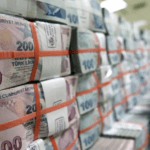Economists and market actors expect consumer inflation to be around 40-45 percent by the end of 2024. The Turkish Central Bank’s (CBRT) forecast is 36 percent, with an upper limit of 42 percent.
Such a huge difference is due to a lack of improvement in confidence and perception, according to the economists.
The Turkish economy closed last year with 64.77 percent consumer inflation, close to the CBRT’s forecast. Inflation forecasts for this year differ between the market and the CBRT.
Although the market and the CBRT agree that inflation will rise to 70-75 percent in the first half of the year, the CBRT forecasts 36 percent at the end of the year, while the market forecasts are shaped between 40-45 percent.
Garanti BBVA Investment predicts 45 percent, Deniz Yatırım 40-45 percent, Yatırım Finansman 42.2 percent, İş Yatırım 42 percent, Gedik Yatırım 42 percent, Alnus Yatırım 42 percent, Halk Yatırım 39.5 percent, İnfo Yatırım 39.2 percent for year-end inflation in 2024. While the year-end expectation of economists in Reuters’ surveys was 42.85 percent, the expectation was 42.39 percent in AA Finans’s survey. International credit rating agency Moody’s and Fitch have a year-end inflation forecast expectation of 45 percent and 38 percent, respectively.
Will there be another Naci Agbal case?
Economists and market experts support the Central Bank’s monetary policy moves to control domestic demand, its steps to do so by drawing attention to the need for foreign capital inflows, and its statements that it will maintain its tight stance as long as necessary, and agree that this policy will make significant progress in the fight against inflation. However, the market has such a trauma that this situation differentiates the year-end inflation forecasts from those of the Central Bank. As Koç University Professor Prof. Dr. Selva Demiralp often brings up, there is no belief and confidence that there will not be another ‘Naci Ağbal case’, former CBRT governor who was sacked after raising interest rates. Although the Central Bank has made the right moves with strong interest rate hikes, according to the information given by market experts and economists, there is no full confidence that the economic management and the CBRT’s policies will be long-term.
It takes time to change the perception
According to economists, even if demand and cost-driven inflation is brought back on track by monetary and fiscal policy, it takes time for the perception to change. Since this confidence cannot be established, pricing is shaped by the deteriorating perception rather than the Central Bank’s guidance, and this creates a basis for an increase in inflation.
Consumers’ anxious buying spree continues
In addition to the anxieties of economists and the market, there is also an important perception of the consumer, which has not yet been broken, which is one of the factors that make a difference in inflation forecasts: Consumers still bring their demand forward due to high inflation. And it seems difficult to break this behavior as long as the increases in both foreign exchange and inflation continue. Bilkent University Prof. Dr. Hakan Kara also pointed out that the upward trend in real credit card expenditures continues and pointed out that the behavior of “Buy today, you cannot find it at this price tomorrow” continues. The share of consumption goods imports in total imports also rose sharply in 2023.
U-turn concerns after the local elections
Another concern for the economic management and the Central Bank is the direction in which the tight monetary policy will evolve after the local elections. Although Governor Erkan emphasized their determination and Treasury and Finance Minister Mehmet Şimşek made statements in this direction, economists and market experts are still concerned that there may be a change in policies. And most importantly, experts point out that the threat of a loosening of the tight monetary policy, that is, an early start of policy rate cuts, is alive.
Hike in minimum wage above expectations
In addition to perception and trauma, according to economists, another risk to the year-end inflation forecast stemmed from the minimum wage hike. The 49 percent hike in the minimum wage exceeded the end-2024 inflation forecast of 36 percent and even the upper limit of 42 percent. The Central Bank also stated that monthly inflation will rise in January due to minimum wage adjustments, and that this increase will slow down in February and beyond. Economists also believe that the hike above year-end expectations will weaken the Central Bank’s hand in curbing demand.










